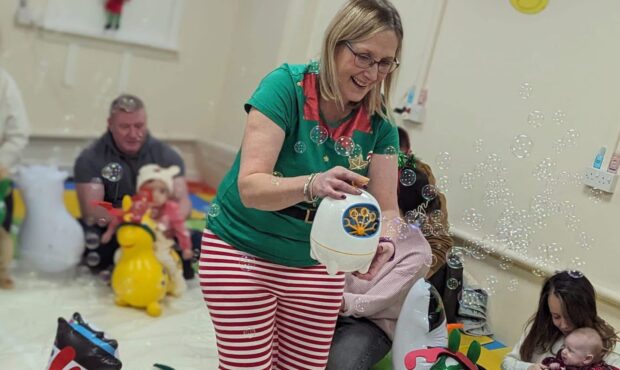A leading Scottish doctor has revealed how she suffered from a serious pregnancy illness twice, forcing both her and her babies to undergo lifesaving treatment.
Shilpi Szwejkowska, a consultant interventional radiologist at Ninewells Hospital in Dundee, is calling for a test that can diagnose pre-eclampsia in pregnant mothers to become available in Scotland.
The test called PlGF, is being rolled out to 90% of mothers in England and most maternity hospitals in Wales.
Now Szwejkowska, who practises under her maiden name, Dr Pal, is urging the Scottish Government to speed up its introduction after the Scottish Health Technologies Group approved its use in March 2023.
Up to 8% of pregnant women are affected by pre-eclampsia, making it among the most common reasons for treatment in NHS obstetric emergency services.
‘Very lucky to survive’
Szwejkowska, 47, a mum of three, developed the high-blood-pressure pregnancy illness during her first and third pregnancies.
She said: “I became seriously ill. One of our children had to undergo rigorous treatment for prematurity in neonatal intensive care.
“He had to be delivered 10 weeks early to save us both.
“From there I was transferred to high dependency to recover while my son began his struggle to live in the nearby neonatal ICU. My treatment involved magnesium to prevent me having seizures, a risk to mums with the very high blood pressure caused by pre-eclampsia.
“The potentially life-saving PlGF test gives obstetricians a chance to treat the mother and also strengthen and mature their babies’ lungs in preparation for a premature birth.”
She added that she and her sons were “very lucky to survive”, adding: “Not every woman is as lucky to have access to good perinatal (after childbirth) and neonatal care, globally.
“By detecting high blood pressure in a timely fashion, maternal deaths could be reduced by 25% in developing countries saving 70,000 lives. In Scotland, the risk of harm coming to pregnant women and their babies would be lowered.
“Remember that the most serious cases of pre-eclampsia increase the risk of strokes to the mothers.”
Further health risks
Their higher risk of heart attacks and strokes is lifelong.
It is an area of health that crosses the divide into her job as an interventional radiologist.
Her job involves a hi-tech process of retrieving and removing blood clots from patients with strokes. This is done by operating on patients through narrow blood vessels in their arms or groins, allowing the consultant to feed a probe up to the brain and remove the clot.
Like many mothers who have suffered pre-eclampsia, Szwejkowska has a legacy of high blood pressure and an increased risk of cardiovascular disease, which includes strokes and heart attacks in middle age and older.
“I take medication to prevent these after being prompted by obstetrician friends at a party,” she added. “Most working mothers need to be prompted to check their blood pressure.
“Advice on monitoring blood pressure must be given to mothers on leaving maternity hospitals and essentially throughout life.
“We need more than a leaflet given to them when they leave hospital or at postnatal visits.”
An article in The Lancet medical journal reveals the PlGF test saves £150 per patient in costs of hospital treatment to mothers and babies.
It is a gain of at least £200,000 a year to the NHS in Scotland and a lifesaving move to mothers and babies.
Professor James Walker, who chaired the Confidential Enquiry Into Maternal And Child Deaths, is campaigning with charity Action On Pre-eclampsia (Apec) to strongly urge the Scottish Government to include PlGF testing in routine maternity care.
The Dundee-born obstetrician who worked in pioneering treatments for pre-eclampsia in Glasgow and Leeds, said: “The PlGF is vital in preventing mothers and babies suffering the consequences of pre-eclampia.
“The risk of cardiovascular disease also continues in these women and a phone app would allow them to record blood pressure, weight and exercise in life and flag up their risk of heart attacks, strokes and other serious events.”
Pre-eclampsia testing
The PlGF test was approved in March 2023 by the Scottish Health Technologies Group but Freedom of Information requests by Apec revealed recently that not one health board offered it.
A pre-eclampsia risk can be inherited by the daughters of affected mothers. One in four will inherit it, said Walker.
Szwejkowska, who raised money for Apec by running the London marathon this year, says her daughter may inherit the condition in the future and that her grandmother had a heart attack in her 50s, when there was little awareness of proper diagnosis then.
The Scottish Government said it expected all NHS boards to implement PlGF testing effectively and consistently. But, it said: “Initial indications from boards show that testing capacity and infrastructure pose challenges for implementation.”











